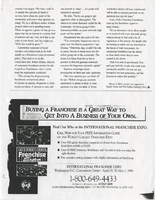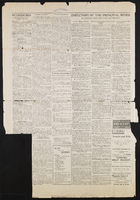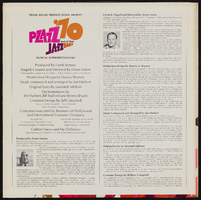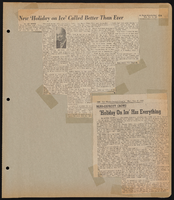Search the Special Collections and Archives Portal
Search Results

Transcript of interview with Sonja Saltman by Barbara Tabach, August 18, 2015
Date
Archival Collection
Description
Included in this oral history are reminiscences of Sonja Saltman's personal non-Jewish heritage in Austria, the importance of her grandmother in her life, and how she recalls becoming part of the Jewish community.
Sonja Saltman is a psychologist and philanthropist in Las Vegas, Nevada. She is executive director and co-founder of the Existential Humanistic Institute, a non-profit organization based in San Francisco, California that offers training in existential-humanistic therapy and theory. In 2003 Sonja and her husband Michael Saltman founded the Saltman Center for Conflict Resolution at the University of Nevada, Las Vegas (UNLV) William S. Boyd School of Law. The Saltman Center is focused on research, teaching, and public service related to "the advanced study of the nature of conflict and how to resolve it." A native of Austria, Sonja Saltman also serves as the Honorary Consul for Austria in Las Vegas. The Saltmans are involved with multiple charitable organizations and initiatives, both locally and abroad. Sonja Saltman has served on the boards of the Anti-Defamation League, Nevada Women's Philanthropy, and the Black Mountain Institute. Projects that the couple has supported include the rebuilding of homes and bridges is Bosnia, and Streetball Hafla, a basketball program to improve relations between Jewish and Arab teenagers in Israel. In 2014 Sonja and Michael Saltman were recognized as Distinguished Nevadans by the Nevada System of Higher Education. Included in this oral history are reminiscences of her personal non-Jewish heritage in Austrian, the importance of her grandmother in her life, and how she recalls becoming part of the Jewish community.
Text

Transcript of interview with Gerald Gordon by Barbara Tabach, November 02, 2016
Date
Archival Collection
Description
In 1961, at the age of thirteen, Gerald ?Jerry? Gordon became a bar mitzvah. This typical coming of age celebration was unusual in that he had simultaneously studied in both his home state of California and his adopted home of Las Vegas, where he spent summers with his grandparents. 1961 is also the same year that the Gordons made Las Vegas their permanent home. Jerry graduated from Las Vegas High School, attended University of Nevada, Las Vegas and earned his law degree from University of California, Los Angeles. His gregarious and trustworthy personality led him to career building steps in the legal community of Las Vegas that included illustrious names such as Louis Wiener, Jr., David Goldwater, Neil Galatz, and many others. His personal law specialty became bankruptcy, especially dealings with hotel/casinos. As a member of the Jewish community, Jerry?s energy and expertise to organize was instrumental in the construction of Congregation Ner Tamid, the reform synagogue, at its site on Valle Verde and I-215. It was a multi-year process and includes a vast array of stories?a cash donation from Moe Dalitz, finalization of receiving of a donation land from the Greenspun family during the High Holy Days, and the ongoing challenges of a building campaign during a recession. In addition, he explains that CNT included two unique negotiations: 1) a cell tower and 2) a solar field on the synagogue?s property. Jerry and his wife Yvonne met while attending UNLV. Yvonne taught math at various levels in the Clark County School District. They raised their two children, Sara and Jeffrey, in Las Vegas, and forged an important role together in Congregation Ner Tamid. In April 2017, they were among those honored for their work with the synagogue.
Text

Transcript of interview with Sari and Paul Aizley by Claytee D. White, November 4, 2016
Date
Archival Collection
Description
As Sari and Paul Aizley recall their separate childhoods and journeys to Las Vegas, their work and volunteer histories, their efforts to build a better society, and their life together they speak to each other as much as they respond to questions about their observations on the growth of the Las Vegas urban environment and their contributions to Southern Nevada's cultural development and a just society. In this interview, Sari and Paul speak to the cross-town commute and the physical UNLV campus in the late 1960s; the growth of the UNLV Math Department; the evolution of UNLV's Continuing Education; the State's North-South funding rivalry as reflected in the built environments of University of Nevada in Las Vegas and in Reno; plans to build a paleontology research facility at Tule Springs National Monument; the Review-Journal's "Ask Jessie Emmet" Real Estate column; local ACLU offices and politics; Fair Housing; transgendered persons; the Nevada State Assembly, and Class! magazine for Clark County high school students. Sari and Paul smile at each other as they recall how the editor/publisher met the bearded math professor and fell in love—despite the fact that they tell slightly different versions of their initial meeting(s). Sari passed away November 1, 2017, three days shy of one year after she participated in this interview.
Text

Leonard M. Jessup interview, August 6, 2018: transcript
Date
Description
“I decided to just keep going, and I devoted my career to higher ed. I wanted to continue putting back into this system that I felt I got a lot out of. Again, repaying a debt.” What began as a passion for playing school sports would later lead Dr. Len Jessup on a path to lifelong service in the area of higher education. From his California childhood he would soon find himself across different U.S. states performing various higher education duties from professor to university president. In this interview, Jessup talks about his grandparents’ decision to emigrate from Italy to the U.S. and how grateful he feels towards his family as a result. He recalls playing baseball in college. In his eyes, being part of several sports teams helped him develop into the person he is now. He describes doing research during at the University of Arizona and speaks to what it was like moving from one university position to the next. Ultimately, his colleagues would recommend that he move to Las Vegas to
Text

Nick Robone oral history interview: transcript
Date
Archival Collection
Description
Oral history interview with Nick Robone conducted by Claytee D. White and Barbara Tabach on December 21, 2017 for the Remembering 1 October Oral History Project. In this interview, Nick Robone, born and raised in Nevada, details his process of healing after being shot during the 2017 Las Vegas mass shooting at the Route 91 Harvest music festival. He discusses the events of that Sunday night and how he has learned to view life in a more positive light. Robone mentions various coping mechanisms that have helped him, including being open about his experience and talking about it with other survivors as well as pursuing his passions.
Text





